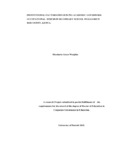| dc.description.abstract | This purpose of this study was to investigate the institutional factors influencing
academic governor’s occupational stress in secondary school in Dagoretti sub-county
Kenya. The objectives of the study were to determine the extent to which
preparedness for allocated role, staff workload, conflict between academic and
administrative roles, institutional policies on discipline and office politics influence
occupational stress in secondary school in Dagoretti. The study used the descriptive
survey design. Random sampling was adopted in the administration of the
questionnaires and employed the use of two sets of questionnaires: a HODs’ and a
principals’ questionnaire. . In total 67 HODs and 12 principals in all the 12 public
secondary schools in Dagoretti District were targeted. In total 21 HODs and 7
principals participated in the study. The use of Statistical Package for Social Sciences
was employed in the analysis of data. Quantitative data was generated from the closeended
questions while qualitative data was generated from the open-ended questions
in both the questionnaires. Findings of the study revealed; the lack of preparedness
for allocated role, workload, obnoxious institutional polices on discipline, role
conflict between administrative and academic tasks and office politics were the
institutional factors that caused high levels of occupational stress on the academic
governors. However, the levels of occupational stress differed from one academic
governor to the other depending on their gender, role and effort that the particular task
demands, subject combination and academic qualifications. For instance on workload
governors who had more than 25 lessons (5.6%) a week, who worked for more than
10 hours(50%) a day and who reported before 7 am (66%) registered that they found
their positions extremely stressful, science and technical department heads (23%)
registered they found their duties difficult to manage while other departments
registered they found their roles manageable. Female governors registered higher
number of governors who found their position stressful. The study recommends that
MOE should move to develop a policy on stress management to guide the induction,
operations and counseling of academic governors in designing effective stress
management programmes in counties. The study also recommends that Teachers also
should also learn how to relate with stressed academic governors to avoid being the
triggers of aggravated stress. Above all the study recommends that all academic
governors should find a way to curb the adverse effects of occupational stress so as to
find a level they can operate in and be productive. | en_US |

